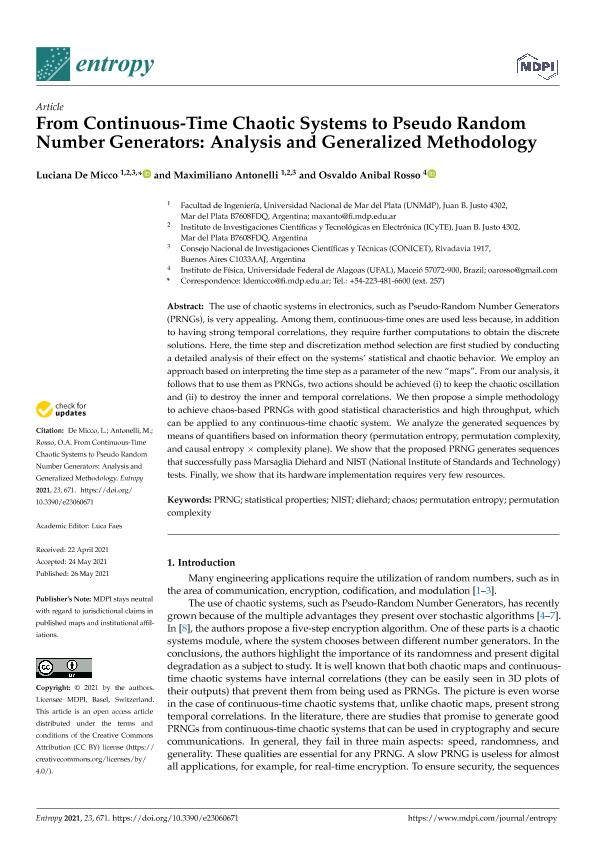Mostrar el registro sencillo del ítem
dc.contributor.author
de Micco, Luciana

dc.contributor.author
Antonelli, Maximiliano

dc.contributor.author
Rosso, Osvaldo Anibal

dc.date.available
2022-10-21T15:42:56Z
dc.date.issued
2021-05
dc.identifier.citation
de Micco, Luciana; Antonelli, Maximiliano; Rosso, Osvaldo Anibal; From continuous-time chaotic systems to pseudo random number generators: Analysis and generalized methodology; Molecular Diversity Preservation International; Entropy; 23; 6; 5-2021; 1-17
dc.identifier.issn
1099-4300
dc.identifier.uri
http://hdl.handle.net/11336/174385
dc.description.abstract
The use of chaotic systems in electronics, such as Pseudo-Random Number Generators (PRNGs), is very appealing. Among them, continuous-time ones are used less because, in addition to having strong temporal correlations, they require further computations to obtain the discrete solutions. Here, the time step and discretization method selection are first studied by conducting a detailed analysis of their effect on the systems’ statistical and chaotic behavior. We employ an approach based on interpreting the time step as a parameter of the new “maps”. From our analysis, it follows that to use them as PRNGs, two actions should be achieved (i) to keep the chaotic oscillation and (ii) to destroy the inner and temporal correlations. We then propose a simple methodology to achieve chaos-based PRNGs with good statistical characteristics and high throughput, which can be applied to any continuous-time chaotic system. We analyze the generated sequences by means of quantifiers based on information theory (permutation entropy, permutation complexity, and causal entropy × complexity plane). We show that the proposed PRNG generates sequences that successfully pass Marsaglia Diehard and NIST (National Institute of Standards and Technology) tests. Finally, we show that its hardware implementation requires very few resources.
dc.format
application/pdf
dc.language.iso
eng
dc.publisher
Molecular Diversity Preservation International

dc.rights
info:eu-repo/semantics/openAccess
dc.rights.uri
https://creativecommons.org/licenses/by/2.5/ar/
dc.subject
PRNG
dc.subject
STATISTICAL PROPORTIES
dc.subject
NIST
dc.subject
DIEHARD
dc.subject
CHAOS
dc.subject
PERMUTATION ENTROPY
dc.subject
PERMUTATION COMPLEXITY
dc.subject.classification
Ingeniería Eléctrica y Electrónica

dc.subject.classification
Ingeniería Eléctrica, Ingeniería Electrónica e Ingeniería de la Información

dc.subject.classification
INGENIERÍAS Y TECNOLOGÍAS

dc.title
From continuous-time chaotic systems to pseudo random number generators: Analysis and generalized methodology
dc.type
info:eu-repo/semantics/article
dc.type
info:ar-repo/semantics/artículo
dc.type
info:eu-repo/semantics/publishedVersion
dc.date.updated
2022-09-20T20:09:49Z
dc.journal.volume
23
dc.journal.number
6
dc.journal.pagination
1-17
dc.journal.pais
Suiza

dc.journal.ciudad
Basel
dc.description.fil
Fil: de Micco, Luciana. Consejo Nacional de Investigaciones Científicas y Técnicas. Centro Científico Tecnológico Conicet - Mar del Plata. Instituto de Investigaciones Científicas y Tecnológicas en Electrónica. Universidad Nacional de Mar del Plata. Facultad de Ingeniería. Instituto de Investigaciones Científicas y Tecnológicas en Electrónica; Argentina
dc.description.fil
Fil: Antonelli, Maximiliano. Consejo Nacional de Investigaciones Científicas y Técnicas. Centro Científico Tecnológico Conicet - Mar del Plata. Instituto de Investigaciones Científicas y Tecnológicas en Electrónica. Universidad Nacional de Mar del Plata. Facultad de Ingeniería. Instituto de Investigaciones Científicas y Tecnológicas en Electrónica; Argentina
dc.description.fil
Fil: Rosso, Osvaldo Anibal. Universidade Federal de Alagoas; Brasil
dc.journal.title
Entropy

dc.relation.alternativeid
info:eu-repo/semantics/altIdentifier/url/https://www.mdpi.com/1099-4300/23/6/671
dc.relation.alternativeid
info:eu-repo/semantics/altIdentifier/doi/http://dx.doi.org/10.3390/e23060671
Archivos asociados
